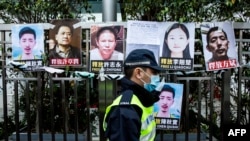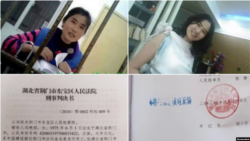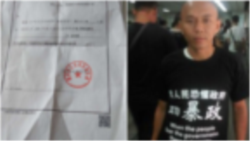China's recent sentencing of a blogger and its arrest of a veteran rights activist indicate that Beijing is determined to continue silencing any critics of the ruling party and government.
Liu Yanli, a blogger in China's Hubei Province, was sentenced April 22 to four years in prison by the local court for crimes of provocation. The court document said she was guilty of "picking quarrels and provoking trouble," and that her online speech about current and former party leaders had damaged the government's image.
A week later, police took activist Xie Wenfei into custody for "provoking trouble." Xie, who has long been part of China's pro-democracy movement, has criticized the disappearance of several citizen journalists and rights activists who were involved in posting information about the government's handling of the COVID-19 outbreak.
Blogger Liu Yanli
The verdict by the local court stated that Liu Yanli fabricated false information on messenger apps to attack the Communist Party of China and state leaders, and that her behavior constituted a crime of provocation.
Liu had been active on Chinese social media accounts since 2009, commenting on democracy and politics. She circulated articles on WeChat about Chinese President Xi Jinping, former premier Zhou Enlai and Chairman Mao Zedong. She also maintained a blog which was often critical of the government and the police. Police repeatedly harassed her over her postings.
Liu's defense lawyer, who is also a relative, said her treatment resembles detention practices from the Cultural Revolution, because the charges all related to her statements online, which should be protected as free speech by China's Constitution.
Article 35 of the Constitution proclaims, "Citizens of the People's Republic of China enjoy freedom of speech, of the press, of assembly, of association, of procession, and of demonstration." However, the Constitution carries little weight in China's courts, where judges often rule in line with the Communist Party's preferences.
"We were not allowed to visit her since the lockdown in January," her sister Liu Yuehua told VOA. "I believe in her innocence. As long as she's not tortured until she's crazy, we will continue to appeal."
Liu made her last public appearance in court on Jan. 30, 2019. In her final statement, she said that this was not a legal case, but a political one.
"I'm just an ordinary citizen, I'm not a party member. I use common sense to express my opinions, but now I'm facing a guilty verdict, I don't think this is in line with the party's slogan 'serve the people,'" she said.
She also mentioned the Cultural Revolution, the decade in China when education ground to a halt, and society was overtaken by outbreaks of violence and political persecution.
"During the Cultural Revolution, if you want to make someone suffer, you just have to say he/she is anti-Party, and you are all set," she said.
Liu's defense lawyer Wu Kuiming told VOA that the 29 charges listed in the indictment were all related to online remarks, pointing out that the case was similar to that of Lin Zhao and Zhang Zhixin, who were shot during the Cultural Revolution because of their "counter-revolutionary" remarks.
Veteran activist Xie Wenfei
Meanwhile, police detained activist Xie Wenfei on April 29 on suspicion of "picking quarrels and provoking trouble."
Xie is a veteran rights activist in China's Hunan province. He recently has criticized the detention of three young volunteers who archived censored information about COVID-19 online, and questioned the disappearance in Wuhan of citizen journalists Chen Qiushi and Fang Bing. He also signed an online petition to honor the COVID-19 whistleblower Dr. Li Wenliang.
"This is not the first arrest," his brother Xie Qiufeng told VOA. "The police didn't tell me anything specific. I think it's about what he had posted on WeChat again."
Born in 1977, Xie Yunfei is a veteran activist who has been detained many times for exercising his rights to freedom of expression and peaceful assembly over the years. He previously served a 4.5-year prison sentence for supporting the 2014 Occupy Central protests in Hong Kong.
Xie's friend Ou Biaofeng, who is also an activist, told VOA that he's not surprised about Xie's arrest.
Ou said that in recent years, the government has severely reduced the space for civil liberties by rounding up rights lawyers, labor activists and citizen journalists. He added that anyone who expresses a slightly different opinion online will have their account blocked immediately.
"The pro-democracy movement in China has entered a freezing winter because of the crackdown," he said. "The pressure is just enormous. Also, for the past year or two, there's been less and less support of civil movements. It's quite sad."
The press freedom group Reporters Without Borders ranked China near the bottom of its 2020 press freedom index. The group said President Xi is tightening control over news and information and trying to export the country's oppressive surveillance systems.







